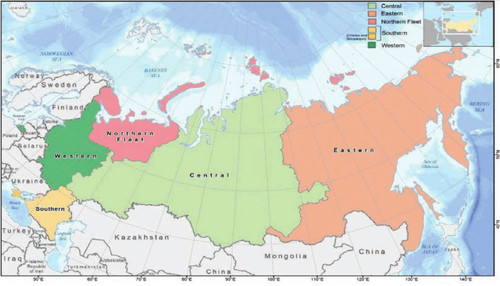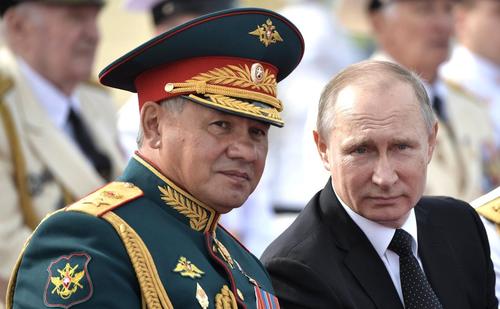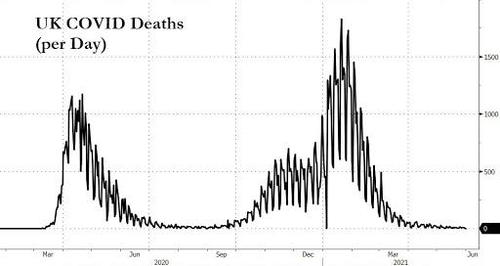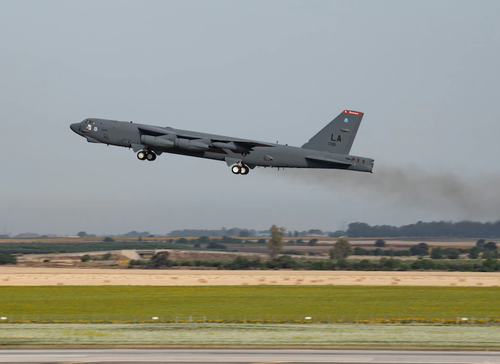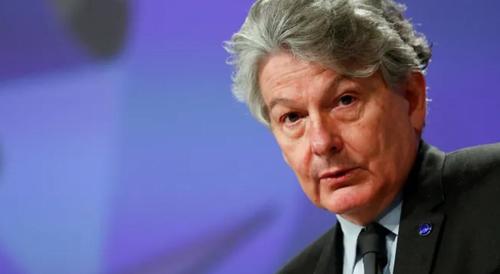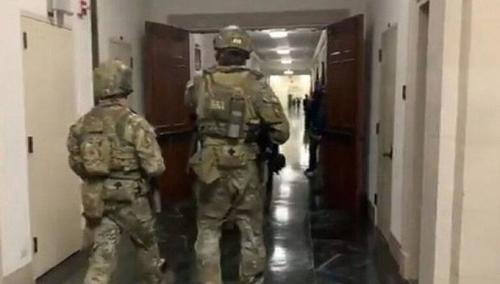Authored by Soeren Kern via The Gatestone Institute,
The European Parliament has halted ratification of a controversial investment treaty with China until Beijing lifts sanctions on European lawmakers, academics and think tanks. The move, a rare display of fortitude by an institution notorious for vacillation, reflects a hardening stance in Europe toward the Chinese Communist Party.
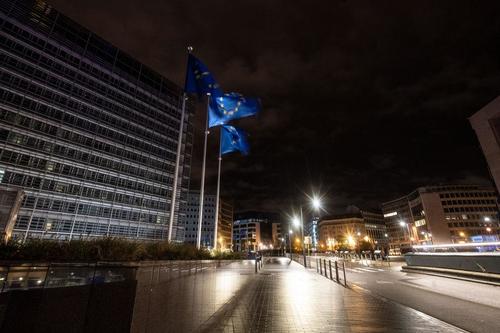
The ratification freeze, backed by all of the major groupings in the European Parliament, is significant for several reasons:
-
it represents a turning point in EU-China relations, in that Beijing no longer calls the shots;
-
it marks a shift in the balance of power in favor of the European Parliament at the expense of the European Commission;
-
and it signifies the beginning of the end of Merkelism, and ideology which has, among other things, consistently prioritized commercial interests over human rights concerns, whether in China, Russia or Iran.
The European Parliament on May 20 overwhelmingly passed a resolution to “freeze” ratification of the deal with 599 votes in favor, 30 against and 58 abstentions. A statement said:
“The resolution emphasizes that any consideration by the European Parliament of the EU-China Comprehensive Agreement on Investment (CAI) … as well as any discussion on its mandatory ratification by MEPs, have ‘justifiably been frozen’ because of the Chinese sanctions.
“MEPs demand that China lift the sanctions before they consider the agreement…. They also remind the European Commission that MEPs will take the human rights situation in China, including in Hong Kong, into account when deciding whether to endorse the agreement or not….
“MEPs also call for re-balancing EU-China relations. They support a toolbox of autonomous measures such as legislation against distortive effects of foreign subsidies on the internal market, an import ban on forced labor goods as well as an enhanced and strengthened EU Foreign Investment Screening Regulation. The EU also needs to adequately address China’s cybersecurity threats and hybrid attacks.”
The CAI was concluded in great haste on December 30, 2020 by German Chancellor Angela Merkel, French President Emmanuel Macron, President of the European Commission Ursula von der Leyen and European Council President Charles Michel. Other EU countries were excluded from the negotiations. Merkel reportedly wanted an agreement at any cost before Germany’s six-month EU presidency ended on December 31.
The lopsided agreement, which ostensibly aims to level the economic and financial playing field by providing European companies with improved access to the Chinese market, actually allows China to continue to restrict investment opportunities for European companies in many strategic sectors. The deal also lacks meaningful enforcement mechanisms for issues that the EU claims to care about, such as climate change and human rights, including forced labor.
On December 30, Von der Leyen proudly declared that the CAI will “uphold our interests” and “promote our core values.” On January 6, only seven days later, Chinese launched a massive crackdown on democracy activists in Hong Kong.
Former Hong Kong Governor Lord Patten said the CAI makes a “mockery” of the EU’s ambitions to be taken seriously as a global and economic player:
“It spits in the face of human rights and shows a delusional view of the Chinese Communist Party’s trustworthiness on the international stage.”
In commentary published by the Financial Times, columnist Gideon Rachman argued that the deal was “naive” and will increase China’s leverage over Europe:
“Over the past year, China has crushed the freedom of Hong Kong, intensified oppression in Xinjiang, killed Indian troops, threatened Taiwan and sanctioned Australia. By signing a deal with China nonetheless, the EU has signaled that it doesn’t care about all that….
“China has repeatedly demonstrated its willingness to use its economic power as a strategic weapon. By deepening their economic reliance on China — without coordinating their policy with fellow democracies — European nations are increasing their vulnerability to pressure from Beijing. That is a remarkably shortsighted decision to make.”
Sanctions and Countersanctions
The current standoff revolves around burgeoning evidence of massive human rights abuses by the Chinese Communist Party against Uyghur Muslims in Xinjiang, a remote autonomous region in northwestern China. Human rights experts say that at least one million Muslims are being detained in hundreds of internment camps, where they are subject to torture, mass rapes, forced labor and sterilizations.
In November 2018, Western countries including France, Germany and the United States called on China to close down detention camps in Xinjiang.
In October 2019, the Trump Administration imposed sanctions on Chinese individuals and entities accused of responsibility for abuses against Uyghurs in Xinjiang. It imposed additional sanctions in May, June and July 2020. On January 19, 2021, then U.S. Secretary of State Mike Pompeo determined that China, under the direction and control of the Chinese Communist Party, has committed genocide against Uyghurs and other ethnic and religious minority groups in Xinjiang.
In March 2021, the European Union, the United Kingdom and Canada, presumably under pressure from the United States, announced (here, here and here) that they too had imposed sanctions on Chinese officials accused of Uyghur-related human rights abuses in Xinjiang.
China responded by imposing sanctions (here, here and here) on more than two dozen European, British and Canadian lawmakers, academics and think tanks.
The sanctioned individuals, who are prohibited from entering China, include German lawmaker Reinhard Bütikofer, who chairs the European Parliament’s delegation to China; four other Members of the European Parliament; Tom Tugendhat, who chairs the Foreign Affairs Committee of the British Parliament; four other Members of the British Parliament; Sjoerd Wiemer Sjoerdsma of the Dutch Parliament; Samuel Cogolati of the Belgian Parliament; Dovilė Šakalienė of the Lithuanian Parliament; Iain Duncan Smith, former leader of the British Conservative Party; British scholar Joanne Nicola Smith Finley; German scholar Adrian Zenz; and Swedish scholar Björn Jerdén.
The individuals have publicly criticized the Chinese government for human rights abuses. Sjoerdsma, for instance, recently called for a boycott of the Winter Olympics in Beijing in 2022. Cogolati and Šakalienė have drafted genocide legislation, while Zenz has written extensively on the detention camps in Xinjiang.
China also sanctioned the EU’s main foreign policy decision-making body, known as the Political and Security Committee; the European Parliament’s Subcommittee on Human Rights; the Berlin-based Mercator Institute for China Studies; the UK-based China Research Group; the Conservative Party Human Rights Commission; and the Alliance of Democracies Foundation, a Danish think tank founded by former NATO secretary-general Anders Fogh Rasmussen.
China contends that its sanctions are tit for tat — morally equivalent retaliation — in response to those imposed by Western countries. In fact, the European sanctions are for crimes against humanity, whereas the Chinese sanctions seek to silence European critics of the Chinese Communist Party.
In a March 22 statement, China’s Ministry of Foreign Affairs said:
“The Chinese side urges the EU side to reflect on itself, face squarely the severity of its mistake and redress it. It must stop lecturing others on human rights and interfering in their internal affairs. It must end the hypocritical practice of double standards and stop going further down the wrong path. Otherwise, China will resolutely make further reactions.”
In the days before the European Parliament voted on the CAI, Chinese President Xi Jinping reportedly called German Chancellor Merkel and French President Macron, and Chinese Premier Li Keqiang phoned Italian Prime Minister Mario Draghi, in an unsuccessful effort to save the investment deal.
On May 20, Global Times, the daily tabloid newspaper owned by the Chinese Communist Party, responded to the decision to halt ratification of the CAI:
“The conditions imposed by the European Parliament for resuming ratification process are rough and arrogant. It demands that ‘China lift the sanctions before Parliament can deal with the CAI.’ These sanctions imposed by China are actually countermeasures against the EU’s sanctions over Chinese officials and entities.
“There is no way China will lift those sanctions under pressure from the European Parliament. The European Parliament said in the motion that it ‘calls on the [European] Commission to use the debate around the CAI as leverage to improve the protection of human rights’ in China. Such an intent will be resisted and despised by China.”
On May 21, China’s foreign ministry spokesman Zhao Lijian said that he hoped the EU “could do less emotional venting and more rational thinking, and make correct decisions in line with its own interests.”
On May 25, Chinese Foreign Minister Wang Yi launched a blistering attack against European sanctions: “Our European friends know what is genocide.”
Responses
The European Parliament’s decision to freeze ratification of the CAI has been greeted with broad approval. Reinhard Bütikofer, the German MEP sanctioned by China and co-author of the resolution, said that Beijing’s efforts to silence criticism of the Chinese Communist Party were “as ridiculous as they are arrogant, and they will fail.” Using language from the Chinese playbook, he added: “With its sanctions, China has miscalculated. They should learn from their mistakes and rethink.”
In an interview with Euronews, Bütikofer said that even if China lifts its sanctions, the CAI would have to be modified in order for it to be ratified:
“Basically, the resolution says this agreement is in the freezer, buried very deep in the freezer. And we demand that China lift its sanctions before the European Parliament could be willing to consider dealing with the matter.
“When you look at the substance of the deal, there are issues not really addressing the application of forced labor in China. The deal doesn’t give a very strong conflict-resolution mechanism. If China fails to implement the provisions of the deal, the instruments that we have to force them to live by them, the letter that they have signed onto, are extremely weak.
“There are restrictions with regard to market access. This is neither providing a level playing field nor is really very beneficial to European industry, with a few exceptions maybe. And on the other hand, it allows the Chinese side to enjoy national treatment with regard to European media while European media are still excluded from the Chinese market completely.”
Armin Laschet, a leading candidate to succeed Merkel as German chancellor in general elections in September, said that the CAI could not be ratified unless China lifted its sanctions: “If you want to be our partner, you have to show mutual respect. So, on that issue I would like to see movement on the Chinese side.”
Portuguese MEP Pedro Marques said that China was guilty of an “attack against European democracy.” He declared: “We will not tolerate it.”
Adrian Zenz, the scholar sanctioned by China for unearthing human rights abuses in Xinjiang, tweeted that overwhelming support for freezing ratification of the CAI “is akin to a death sentence.”
China expert Bethany Allen-Ebrahimian said:
“The Chinese government has bungled its relationship with the EU, just as it seemed that Beijing had successfully driven a wedge between a Trump-weary Europe and the Biden administration.”
Indian foreign affairs expert Gautam Chikermane wrote that the EU needs to rethink its first principles “thrice over” and decide what it stands for:
“The announcement says the CAI or any other agreement with China will not move forward while the sanctions are in place. In a corollary, if China pulls back on sanctions, the EU will pull back its rejection. This is geopolitical naivete….
“China cannot and will not be tamed. It will not adhere to the rule of law. It will not give up on its uncouth wolf warriors. It will not change its debt trap diplomacy. It will not end the weaponization of political systems, in this case the fault lines of democracies, to smother democracies. If it is counter sanctions today, it will be intellectual property theft tomorrow, and 5G data surveillance of free citizens next. Under Xi Jinping, China has become a hydra-headed monster.
“Further, the gentle fine print the EU has placed is little more than good manners. Behind this fine print lie the dark lobbies of the EU’s largest corporations. There is danger that the tail of EU capitalism will wag the dog of member states and sovereign democracies into submission….
“The values of liberty, equality and fraternity the EU has floated and disseminated across the world in the 20th century need to be expanded into the 21st century. Right now, these values, and through them the citizens of EU nations, are being ruthlessly smothered by Beijing.
“That the EU continues to imagine business as usual with such a country shows the internal contradictions of values, now sugar-coated by petty corporate interests.”
Japanese analyst Katsuji Nakazawa, writing for Nikkei Asia, added:
“The European Parliament has voted overwhelmingly to freeze the ratification process of an investment pact with China — a deal that Beijing six months ago considered a big strategic victory.
“It has sent shock waves throughout China, with only one month and change before arguably the most important event in President Xi Jinping’s era, the 100th anniversary of the Chinese Communist Party’s establishment, on July 1.
“Some party members are worried that the centenary’s festive mood will be dampened by the harsh diplomatic reality. Not only are China’s relations with the U.S. bad, but now EU relations are stuck in a ditch….
“With Xi playing his cards to remain as China’s top leader beyond the party’s next quinquennial national Congress in the autumn of 2022, he is in no mood to admit to policy failure. Therefore, no major reversals are on the horizon.”
Perhaps Andreas Fulda, a German scholar of China, said it best: “While halting the ratification of CAI is good, scrapping CAI altogether would be better.”

